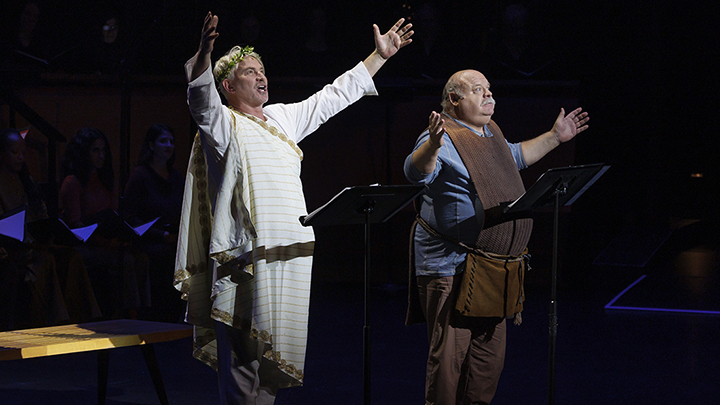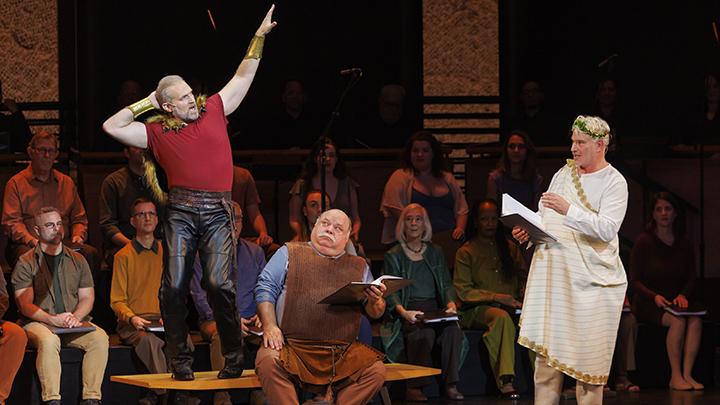
At the time the play was written, Athens had been engaged in a decades long war with Sparta that was not only killing thousands of men but stressing the foundations of their democracy. People were tired of war, cynical and angry and willing to turn against their leaders. So the humor has a serious basis stemming from loss and disillusion. Burt Shevelove freely adapted Aristophanes for a Yale University production staged by the swimming pool (with echoing acoustics) and Meryl Streep and Christopher Durang among the chorus. Shevelove’s A Funny Thing Happened on the Way to the Forum co-creator Stephen Sondheim was prevailed upon to provide musical settings for Aristophanes’ choruses. Euripides and Aeschylus were swapped out for George Bernard Shaw and William Shakespeare. The production was not a success due to the muddled acoustics and muddled presentation. I must remind the reader that in 1974, America was in the final throes of the decades long Vietnam War and dealing with a disillusioned citizenry also stunned by the Watergate scandals.
The Shevelove/Sondheim Frogs pretty much sank into oblivion except for numbers like “Invocation and Instructions to the Audience” being repurposed and revamped for Sondheim revues and concerts. In May of 2000, Nathan Lane, a longtime admirer of the musical, starred as Dionysos (the spelling used in the show), in a condensed concert one-act version of the show staged for Stephen Sondheim’s 70th birthday. Sondheim admired Lane’s improvisations on the script saying they were stylistically similar to Shevelove. After 9/11, Lane prevailed upon Sondheim to expand his score for a proposed new fully musicalized adaptation in Lane’s new adaptation. Sondheim composed seven new songs including solo numbers for the individual characters and expanding the choruses to include the leading players while Lane revised the book. In 2004, the newly expanded The Frogs opened on Broadway at the Vivian Beaumont Theater at Lincoln Center starring Lane as Dionysos directed by Susan Stroman. This revisal met with mixed reviews and closed after 92 performances.
MasterVoices, in the ongoing tributes to Sondheim’s illustrious career after his death last year, scheduled a concert version of The Frogs with Lane adapting the work for that format and presiding as narrator/master of ceremonies. Ted Sperling, artistic director of MasterVoices, presided over the event as conductor and director. There were three performances at the Rose Theater at Jazz at Lincoln Center this past weekend.
Evidently, the Friday night opening showed the cast less than at ease with the material with several flubs, forgotten lines and missed cues – by Saturday night things were much more together with the actors less dependent on their scripts. This was very much a staged reading with the chorus on risers in the back and the actors on book. There was a bench but no other scenery or furniture onstage. Lainie Sakakura provided acrobatic choreography for a talented group of dancers impersonating the titular amphibians and underworld revelers and orgiasts.
This abridged concert version made a persuasive case for the material keeping Lane’s originally sprawling book at the bare minimum. The stripped down concert format highlights the charms of Sondheim’s second tier score by putting it front and center while keeping the proceedings under two hours (the running time was 1 hour 45 minutes without an intermission). By the way, second tier Sondheim is better than 99% of what passes for musical theater writing these days on the Great White Way.
Nathan Lane’s narration was unobtrusive and very informed (as he should be) and frankly we would have been delighted with more of him. He was funny in both his scripted observations and unscripted one-liners – he is a master of comedy both dramatic and stand-up improv.
The cast was led by Douglas Sills as Dionysos and Kevin Chamberlin as his low comedy slave sidekick Xanthias. Sills has always been a polished musical theater leading man with a penchant for sending up his matinee idol good looks with self-parody. This works very well for Aristophanes’ Dionysos, who is portrayed as an effete bumbler who is constantly in need of practical support from his slave Xanthias to get out of scrapes. He delighted in the bouncy “I Love to Travel” while easily moving into the more serious god of drama who arbitrates the final contest between Shaw and Shakespeare. Sills was also moving in his solo “Ariadne” where he mourns the loss of his mortal wife, Ariadne (of Naxos and Strauss fame) who predeceased the immortal god. Sills also was convincingly fervent communicating Dionysos’ belief that artists and art are necessary to culture and civilization and can save us from ourselves. Sills did go up on a lyric once but otherwise was a dapper, effusive presence with a light touch vocally and dramatically reminiscent of Harvey Korman and Leslie Nielsen of Naked Gun fame. Chamberlin is a born baggy pants low comic and was very in charge every moment onstage.
Very solid comic work came from Broadway veterans Marc Kudisch as the flamboyantly macho Herakles who lends Dionysos his lion skin and some manly posturing to confront the terrors of Hades in the winning “Dress Big” solo. The nearly sixtyish Kudisch not only still possesses a leonine baritone voice but also performed a split on the Rose Theater stage. Chuck Cooper as the Stygian ferryman Charon, also a veteran, was in fine crusty voice and had plenty of irreverent attitude and comedic comebacks. Peter Bartlett was a befuddled, rather fey Pluto in his usual Edward Everett Horton/Franklin Pangborn manner which never fails to get lots of laughs. Dylan Baker as a pugnacious rather egotistically self-satisfied Shaw was totally off book and totally in character sparring gleefully with Shakespeare and Dionysos. The elegant Jordan Donica was a seductive Shakespeare with silken vocalism, long legs and compelling ease in delivering his Shakespearean quotes – either ersatz or authentic. Sondheim’s lyrical setting of “Fear no more” was a memorable moment for Donica. Lovely Candice Corbin in a brief appearance as the shade of Ariadne delivering a much needed pep talk and solace to her grieving husband.
The MasterVoices Orchestra delivered the goods all night long under Sperling’s direction. The very mixed chorus was full of interesting, striking voices and personas that stepped forward in solo lines to reveal individual talents. Now this score isn’t at the top of the Sondheim canon and some are put off by the mixture of low comedy and highbrow serious aspirations. I have no problems with it.
The titular green slimy creatures do not figure much in the plot except when they try to kidnap Dionysos and drag him under the river Styx during their fraught journey to the underworld. More pertinently, Dionysos not only hates and fears frogs because they are ugly and slimy but because they in his words: “[H]ave big mouths and narrow little eyes to match their narrow little points of view. Jumping up when you least expect it to scare the hell out of you. At first, they seem harmless enough, but in the blink of an eye they’ve got their tongues wrapped around you and they’ve pulled you into their self-satisfied sedentary little universe. They hate change, they hate new ideas, they just like what’s good for them, and they’d like to turn us all into frogs.” Sound like anyone we know these days? Don’t know whether this comes from 405 BC, 1974 AD or 2004 AD but it speaks directly to 2023 AD.
The Frogs is a troubled comedy for troubled times which seeks to tell another divided democracy that even in our darkest moments we cannot abandon our poets, playwrights and philosophers. Dionysos, Aristophanes, Sondheim and Shevelove remind us that art is more crucial than ever to instruct and heal the minds and hearts of the populace. It was a message from the past I was happy to receive.
Photos: Erin Baiano c. 2023 MasterVoices



























Comments